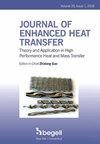Impact of machine learning approach using ANN and RSM to evaluated the engine characteristics of a dual-fuel CI engine
IF 1.5
4区 工程技术
Q3 ENGINEERING, MECHANICAL
引用次数: 0
Abstract
Surge in fossil fuels consumption has severely impacted the environment, namely in terms of climate change, due to the influence of extensive pollution. The current study assesses and contrasts the ability of Artificial Neural Networks (ANN), a machine learning technique, and Response Surface Methodology (RSM) derived model to predict the important engine characteristics such as performance and emissions. The effect of parameters such as load (25%, 50%, 75%, and 100%), speed (1500 RPM and 1800 RPM), compression ratio (17.5 and 18.5), and six different blends of diesel-biodiesel fuels (Diesel, SM20, SM40, SM60, SM80, and SM100) were investigated on test engine (4-S single-cylinder DI diesel engine). Box Behnken Design (BBD) of Response Surface Methodology (RSM) and a Multi-Layer Perceptron (MLP) neural network with a topology of 4-10-6 was employed to study the principal engine performance (brake thermal efficiency, brake-specific fuel consumption, and indicated mean effective pressure) and emission (carbon dioxide, nitrogen oxides, and smoke) parameters. Using statistical analysis on both RSM and ANN, the projected outcomes were then compared with experimental results. The outcomes of present study reveals that RSM (Response Surface Methodology) and ANN (Artificial Neural Networks) can be employed to model processes that exhibit high predictability. Optimization can be performed utilizing diverse strategies, which rely on the specific process or problem.使用 ANN 和 RSM 的机器学习方法对评估双燃料 CI 发动机特性的影响
由于广泛的污染影响,化石燃料消耗量的激增严重影响了环境,即气候变化。本研究评估并对比了机器学习技术人工神经网络(ANN)和响应面方法(RSM)衍生模型预测发动机性能和排放等重要特性的能力。研究了负载(25%、50%、75% 和 100%)、转速(1500 RPM 和 1800 RPM)、压缩比(17.5 和 18.5)等参数以及六种不同的柴油-生物柴油混合燃料(柴油、SM20、SM40、SM60、SM80 和 SM100)对试验发动机(4-S 单缸 DI 柴油发动机)的影响。采用响应面方法(RSM)的盒式贝肯设计(BBD)和拓扑结构为 4-10-6 的多层感知器(MLP)神经网络来研究发动机的主要性能参数(制动热效率、制动油耗和指示平均有效压力)和排放参数(二氧化碳、氮氧化物和烟雾)。通过对 RSM 和 ANN 进行统计分析,将预测结果与实验结果进行比较。本研究的结果表明,RSM(响应面方法学)和 ANN(人工神经网络)可用于为表现出高度可预测性的过程建模。可根据具体流程或问题,采用不同的策略进行优化。
本文章由计算机程序翻译,如有差异,请以英文原文为准。
求助全文
约1分钟内获得全文
求助全文
来源期刊

Journal of Enhanced Heat Transfer
工程技术-工程:机械
CiteScore
3.60
自引率
8.70%
发文量
51
审稿时长
12 months
期刊介绍:
The Journal of Enhanced Heat Transfer will consider a wide range of scholarly papers related to the subject of "enhanced heat and mass transfer" in natural and forced convection of liquids and gases, boiling, condensation, radiative heat transfer.
Areas of interest include:
■Specially configured surface geometries, electric or magnetic fields, and fluid additives - all aimed at enhancing heat transfer rates. Papers may include theoretical modeling, experimental techniques, experimental data, and/or application of enhanced heat transfer technology.
■The general topic of "high performance" heat transfer concepts or systems is also encouraged.
 求助内容:
求助内容: 应助结果提醒方式:
应助结果提醒方式:


